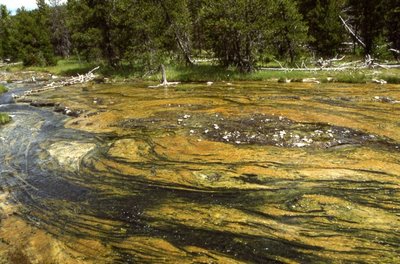PARKS GET ROYALTIES ?
.. After over 15 years of poking around in Yellowstone's thermophiles, the government has decided to explore the ramifications of commercial exploitation of thermophilic bacteria. This has been expanded into a Draft Environmental Impact Statement for all of the National Parks. Not just the algae and bacteria of Yellowstone are addressed, (though they are the driving force,) but all of our park's resources are included in the EIS... The National Park Service news release finally asks for public input. It's available HERE. It's reproduced below. The prefered alternative is:
"The preferred alternative would require researchers to enter into an agreement with the NPS before using their results for commercial purposes. Researchers would have to qualify under the strict standards for a park research permit before any discussion of a benefits-sharing agreement could begin. The agreement would require researchers to provide some benefit back to the park, such as staff training, new research equipment, royalties or money to be used to support resource conservation and management. Researchers would still be prohibited from selling specimens or samples collected in parks. Researchers would not be given any special privileges just because their research may result in a commercial application."
.. Yellowstone National Park is the lead agency in this review process, (as if they had so little to do already,) and the complete EIS information is available through the "Benefits Sharing DEIS Team, Yellowstone Center for Resources, P.O. Box 168, Yellowstone National Park, Wyoming 82190." A Hard copy on CD is available.NPS NEWS RELEASE
National Park Service News Release For Immediate Release:
September 25, 2006
Contact(s): Al Nash, 307.344.2010
Gerry Gaumer, 202.208.6843
National Park Service Releases Draft Environmental Impact Statement On Benefits Sharing For Public Review
A Draft Environmental Impact Statement (EIS) addressing whether the National Park Service (NPS) should benefit from commercial applications arising from research in the parks has been released for public review and comment.
The Servicewide Benefits Sharing Draft EIS addresses the occasional circumstance when researchers who analyze small genetic or biochemical samples discover commercially useful scientific information. The alternatives in the draft EIS do not change the way research permits are issued or the way research is conducted in the national parks. The alternatives only change the obligations some researchers would have to parks as a result of their use of the research.
The alternatives address whether the NPS should benefit in some way if the outcome of research conducted in the parks can be used for commercial purposes, known as benefits-sharing.
The preferred alternative would require researchers to enter into an agreement with the NPS before using their results for commercial purposes. Researchers would have to qualify under the strict standards for a park research permit before any discussion of a benefits-sharing agreement could begin. The agreement would require researchers to provide some benefit back to the park, such as staff training, new research equipment, royalties or money to be used to support resource conservation and management. Researchers would still be prohibited from selling specimens or samples collected in parks. Researchers would not be given any special privileges just because their research may result in a commercial application.
The Draft EIS and an electronic form to submit comments on the internet can be found at the National Park Service’s Planning, Environment and Public Comment (PEPC) website at http://parkplanning.nps.gov. You need to select “Washington Office” and then click on “Benefits Sharing”. The Draft EIS is also available on CD or in hard copy by writing the Benefits Sharing DEIS Team, Yellowstone Center for Resources, P.O. Box 168, Yellowstone National Park, Wyoming 82190.
Written comments may be submitted through the PEPC website, in person, or by mail. Comments will not be accepted over the phone, by fax, or e-mail. All public comments must be received or postmarked by midnight, December 15, 2006.
-www.nps.gov -
. .
.
..nps photo..
_________________________
 .
...nps photo..
_________________________
.."Let's face it: It's hard to protect the parks if no one is interested in them," said Park Service statistician Butch Street. This quote from a news story about why park attendance and camping is down. Read it HERE.
__________________
.. The Helena Independent Record reminds us of the Yellowstone River and its central role in Yellowstone. Read about it HERE.__________
.. Recycling is a key topic in Yellowstone these days. "Five years ago, nearly 90 percent of the trash from Yellowstone's 3 million visitors each year found its way to the landfill. Now, about 65 percent of the trash is recycled." ''Twenty years ago, we were throwing everything in a garbage can and taking it to a landfill,'' said Steve Iobst, the park's chief of maintenance. ''That's not practicing what we preach.'' Read it HERE.